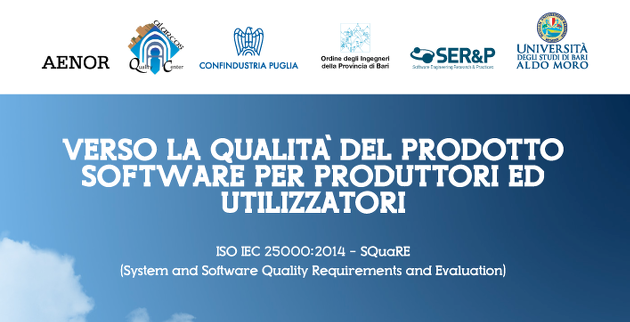On March 20, 2015 the Verso la Qualita Del Prodotto Software per Produttori ed Utillizzatori (Towards Quality Software Products for Producers and Users) Conference was held in Bari (Italy), in which the ISO/IEC 25000 series of standards figured prominently.
The event took place in the convention hall of Confindustria BARI – BAT, and it was organized by the University of Bari, Confindustria Puglia, Ordine degli Ingegneri della Provincia di Bari, SER&Practices, Alarcos Quality Center and AENOR.
The event focused on the certification of software product quality conforming to ISO/IEC 25000, which serves as a tool to strengthen the trust of customers and users in the software products they acquire and use.
After the opening of the event, several presentations were given, whose content is summarized below:
- Prof. Gisuseppe Visaggio, president of SER&Practices, presented the experience of SER&P as the first company in Italy to obtain an ISO/IEC 25000 certificate for its MSH-Mobile product, emphasizing that, contrary to what people may believe, software product quality certification is neither complex nor involves high costs. He also presented the role of SER&P as a consultant within the Evaluation and Certification Ecosystem, accompanying companies that are interested in the evaluation, improvement and certification of the quality of their software products.
- Mario Piattini, scientific director of Alarcos Quality Center, presented the laboratory AQC Lab, which carries out software product quality evaluations based on ISO/IEC 25000. These evaluations serve as a basis for the software product quality certifications issued by AENOR.
- Stefano Cucurachi, marketing director of AENOR Italy, and Carlos Manuel Fernández, ICT Manager of AENOR, presented the role of AENOR as a certifying entity for software product quality conforming to ISO/IEC 25000, and the relevance of this standard in the model for the governance of ICT based on ISO standards.
After the presentations, a roundtable was conducted in which the current advantages and weaknesses of software product certification were discussed. The participants of this roundtable were representatives of the industry in the region of Puglia, among which there were software development companies and organizations for which software and technological support is crucial to the business.
The event received a warm welcome, with attendees both from academia and the industrial sector interested in identifying opportunities for innovation and competitiveness such as the certification of software quality.






